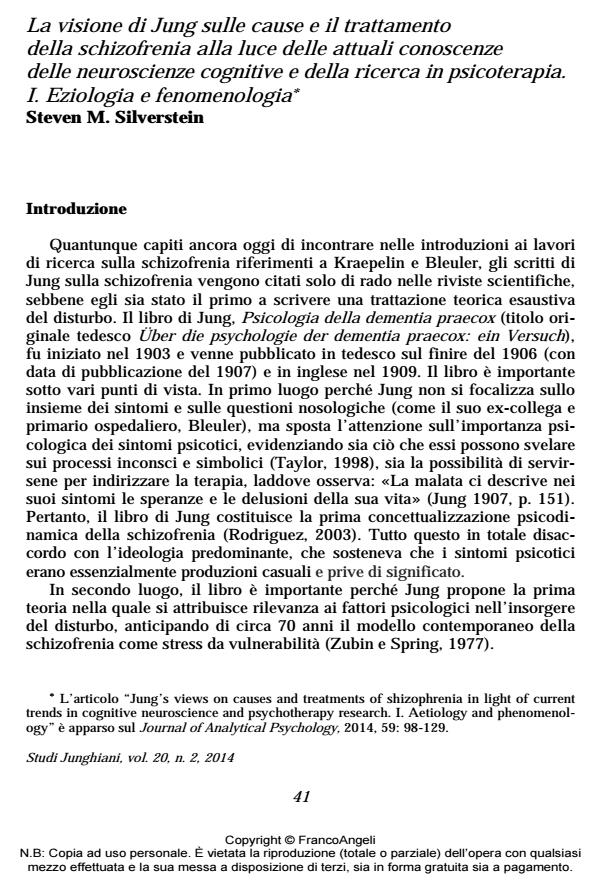La visione di Jung sulle cause e il trattamento della schizofrenia alla luce delle attuali conoscenze delle neuroscienze cognitive e della ricerca in psicoterapia. I. Eziologia e fenomenologia
Titolo Rivista STUDI JUNGHIANI
Autori/Curatori Steven M. Silverstein
Anno di pubblicazione 2015 Fascicolo 2014/40
Lingua Italiano Numero pagine 35 P. 41-75 Dimensione file 262 KB
DOI 10.3280/JUN2014-040003
Il DOI è il codice a barre della proprietà intellettuale: per saperne di più
clicca qui
Qui sotto puoi vedere in anteprima la prima pagina di questo articolo.
Se questo articolo ti interessa, lo puoi acquistare (e scaricare in formato pdf) seguendo le facili indicazioni per acquistare il download credit. Acquista Download Credits per scaricare questo Articolo in formato PDF

FrancoAngeli è membro della Publishers International Linking Association, Inc (PILA)associazione indipendente e non profit per facilitare (attraverso i servizi tecnologici implementati da CrossRef.org) l’accesso degli studiosi ai contenuti digitali nelle pubblicazioni professionali e scientifiche
Oggi gli scritti di Jung sulla schizofrenia sono completamente ignorati o dimenticati. Loscopo di questo scritto è rivedere i temi trattati da Jung nei suoi scritti sulla schizofrenia eaccertare la validità delle sue teorie sul disturbo alla luce delle attuali conoscenze della psicopatologia,delle neuroscienze cognitive e della ricerca in psicoterapia. L’articolo discutecinque questioni degli scritti junghiani sull’eziologia e la fenomenologia della schizofrenia:1) l’abaissement du niveau mental; 2) il complesso; 3) le immagini del mandala; 4) le costellazioniarchetipiche; 5) eziologia della schizofrenia eziologica vs tossicologica. Dallarevisione di queste questioni si profilano tre conclusioni. Primo, le idee di Jung sulla schizofreniaanticipano per molti versi i dati e le ipotesi attuali sul disturbo. Secondo, con l’attualeriavvicinamento dell’approccio psicologico e biologico alla comprensione e al trattamentodella schizofrenia, le idee pionieristiche di Jung sull’importanza di questi due fattori e dellaloro interazione rappresentano una risorsa ancora utile e ricca, per quanto poco utilizzata. Daultimo, uno sforzo più condiviso di comprendere e valutare l’attendibilità dei concetti diJung alla luce delle evidenze neuroscientifiche attuali potrebbe far compiere alla psicologiaanalitica notevoli progressi, ma potrebbe produrre un cambiamento anche negli approcciterapeutici che potrebbe estendersi oltre la cura della schizofrenia.
Parole chiave:Abaissement du niveau mental, eziologia, archetipo, neuroscienze cognitive,complesso, dementia praecox, percezione del mandala, fenomenologia della schizofrenia
Steven M. Silverstein, La visione di Jung sulle cause e il trattamento della schizofrenia alla luce delle attuali conoscenze delle neuroscienze cognitive e della ricerca in psicoterapia. I. Eziologia e fenomenologia in "STUDI JUNGHIANI" 40/2014, pp 41-75, DOI: 10.3280/JUN2014-040003